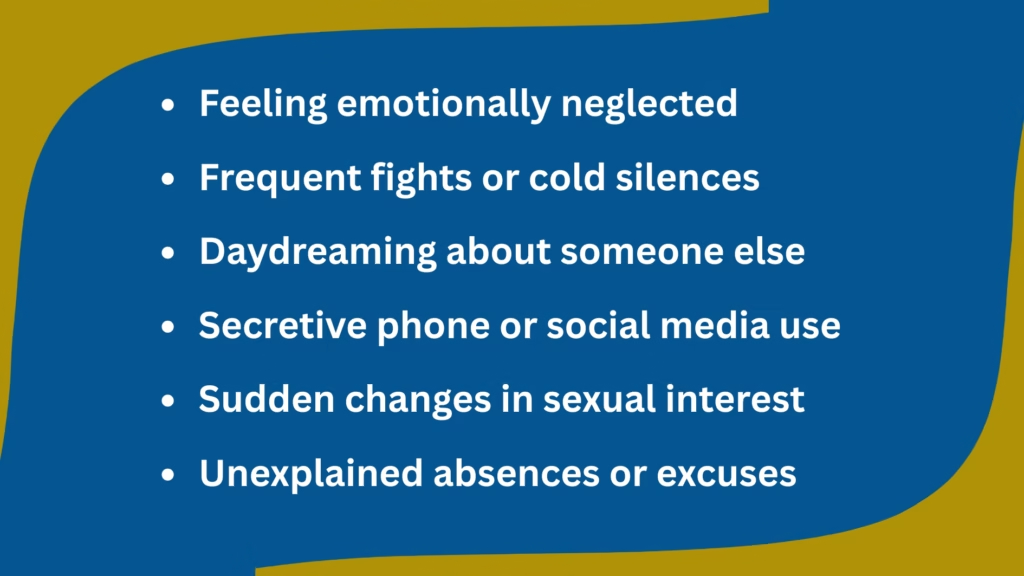The topic of why people cheat has caused innumerable heartbreaks, shattered families, and made people doubt their own value. Infidelity frequently results from severe emotional and psychological scars, perhaps even ones that the cheater is unaware of. It’s not always about lust or excitement. We’ll examine these causes in this piece with compassion and clarity, drawing from firsthand accounts, current studies, and professional opinions.

Why People Cheat: The Emotional Web Behind the Betrayal
Cheating doesn’t just happen. Every betrayal usually has a backstory, such as a storm of unfulfilled wants, inner conflicts, or strained relationships. Let us peel back these layers.
1. Emotional Disconnection from Partner
When emotional intimacy fades, the foundation of a relationship starts to crack.
Real-life Example: Jessica, a nurse from Ohio, shared in an online forum how her partner’s emotional unavailability led her to find comfort in a colleague. It wasn’t physical initially—it started with text messages, long conversations, and eventually, emotional cheating.
Checklist for Preventing Emotional Disconnection:
- Daily check-ins, even brief
- Expressing appreciation
- Regular physical affection
- Scheduling weekly ‘us’ time
2. Validation and Low Self-Esteem
Some people cheat to feel desired, attractive, or seen.
Case Study: A 2023 study from the University of Montreal found that 46% of those who cheated reported low self-worth and craved outside validation.
Expert Insight: Dr. Ramani Durvasula, a clinical psychologist, explains, “Infidelity can often be a way of regulating self-esteem. For some, being desired by another person gives them a temporary sense of worth.”
3. Unmet Sexual Needs
Sexual incompatibility can silently corrode a relationship.
Example: In a podcast episode of Where Should We Begin? by Esther Perel, a couple shared how years of misaligned libidos caused one partner to seek satisfaction elsewhere—not out of spite, but unmet longing.
Tip: Open conversations about fantasies, boundaries, and satisfaction should be normalized—not stigmatized.
4. Attachment Style and Past Trauma
People with avoidant or anxious attachment styles, especially those from emotionally unstable homes, may cheat as a defense mechanism.
Research Insight: A 2022 study in Journal of Family Psychology found that individuals with anxious-avoidant attachment were 2.5 times more likely to engage in infidelity.
Quick Comparison Table: Attachment Style vs. Risk of Infidelity
| Attachment Style | Risk of Infidelity | Description |
|---|---|---|
| Secure | Low | Comfortable with intimacy and independence |
| Anxious | Moderate to High | Craves closeness, fears abandonment |
| Avoidant | High | Struggles with intimacy, fears closeness |
5. Opportunity and Impulsivity
Sometimes, it’s not premeditated. It’s poor impulse control in a tempting situation.
Example: Mark, a married IT consultant from Sydney, shared in a Reddit thread that a business trip and alcohol led to a one-night stand—something he never imagined doing.
Helpful Advice: If you’re vulnerable to temptation, set boundaries before situations arise. Avoid one-on-one late nights or excessive alcohol in unfamiliar settings.
6. Digital Temptation & Emotional Affairs
Online platforms have blurred the boundaries. What starts as harmless DMs can spiral into deep emotional bonds.
Recent Data: Pew Research (2024) shows 38% of adults in relationships consider online flirting or sexting a form of cheating.
Tip: Create clear relationship tech-boundaries: what’s okay to post, message, and how to share digital life with your partner.
7. Cultural and Legal Influences
In societies like the Philippines, where infidelity is criminalized, the stigma adds layers of secrecy, shame, and gender bias.
Insight: A 2022 article in Rappler revealed how legal infidelity charges disproportionately affect women, reflecting deep societal double standards.
How to Heal After Infidelity

If you or your partner has cheated, this isn’t necessarily the end—but it’s definitely a turning point.
Healing Steps:
- Accountability: The cheating partner must own their behavior without blame-shifting.
- Open Dialogue: Seek therapy to rebuild trust.
- Reconnection: Start rebuilding intimacy from scratch, slowly but intentionally.
- Forgiveness: Not forgetting—but choosing to heal, for your own peace.
Expert Resource: The Gottman Institute offers guided programs for couples recovering from betrayal.
Emotional Checklist: Signs You or Your Partner Might Be at Risk
FAQs About Why People Cheat
Q1.What are the main emotional reasons why people cheat?
Emotional neglect, low self-esteem, and unresolved trauma are key drivers.
Q2.Is emotional cheating as damaging as physical cheating?
Yes, many say it hurts more—because it replaces intimacy with someone else.
Q3.Can a relationship survive infidelity?
Yes, with mutual commitment to healing, many couples emerge stronger.
Q4.How common is cheating?
Studies suggest around 20-25% of committed people cheat at least once.
Q5.Do men cheat more than women?
Historically, yes—but recent trends show a narrowing gap.
Q6.Can therapy help after cheating?
Absolutely. Individual and couple’s therapy both play key roles in recovery.
Q7.Is flirting considered cheating?
If it breaks the trust or boundaries of the relationship, yes.
Q8.How do I rebuild trust?
Through consistent honesty, transparency, and time.
Q9.Are open relationships more immune to cheating?
Not necessarily—boundaries still matter, and emotional infidelity can still occur.
Q10.Can you love someone and still cheat?
Yes, but love alone doesn’t prevent betrayal. Emotional awareness and accountability are key.
Final Thoughts: Cheating Isn’t Just About Sex—It’s About Silence
Understanding why people cheat is more important than defending it. Every betrayal is accompanied with a silent pain. a necessity that is disregarded. A communication error. You are not alone if you have been harmed. It’s not the end if you have cheated. You have to own it, though.
Honesty is the first step toward healing.
Special Advice to Readers
Speak. before the gap widens. before the quiet gets intolerable. Just as important as physical intimacy is emotional care. Don’t wait till someone else listens when you didn’t.
Call to Action
Share this article with someone who might be suffering in silence if it resonated with you. Or leave a comment below—your tale could be a lifesaver for someone else.
Useful Articles :-
- Signs of Love Bombing: 7 Red Flags to Spot Manipulative Affection Early
- What Is a Situationship? 7 Unfiltered Truths About Modern Love
- 10 Signs of a Healthy Relationship: What To Look For
- Communication Skills for Couples: 7 Transformative Tips to Strengthen Your Connection
- 7 Powerful Ways to Build Healthy Relationship Boundaries for Lasting Love
- 9 Empowering Steps for Recovering from a Breakup: Heal, Grow, and Thrive
- 7 Powerful Long-Distance Relationship Advice : Tips to Keep the Spark Alive
- Jealousy in Relationships: 7 Powerful Ways to Manage the Green-Eyed Monster
- 5 Insights Into Love Languages in Relationships : Do They Really Work?
- What Does Emotional Safety In Relationships? 7 Biblical Keys to Building Trust and Intimacy
